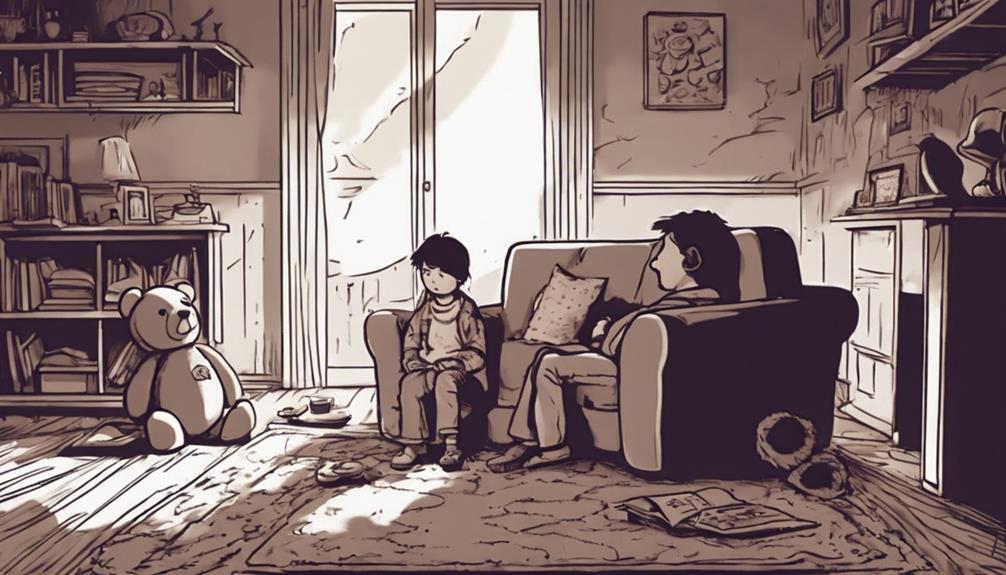Managing guilt from a secret affair isn't easy, but it's an important step towards healing. Start by acknowledging your feelings—embrace the turmoil instead of suppressing it. Reflect on your choices to understand their impact on yourself and others. Open, honest communication fosters trust with your partner, while seeking professional help offers you safe guidance through your emotions. Establish healthy boundaries to protect your well-being, and don't forget to practice self-care; it's essential during this tumultuous time. Finally, focus on personal growth to turn guilt into a source of positive change. There's more insight that can help you navigate this journey.
Acknowledge Your Feelings

It's important to recognize and accept the whirlwind of emotions you're experiencing, as acknowledging your feelings is the first step toward healing and understanding. You might feel guilt, shame, or even confusion about your actions, and that's completely normal.
Emotional honesty is significant during this time. Instead of pushing those feelings away, allow yourself to sit with them. Reflect on what you're feeling and why.
Guilt processing can be particularly challenging, but it's crucial to confront rather than avoid it. Ask yourself what aspects of the situation trigger these emotions. Is it the betrayal of trust, the impact on your partner, or perhaps your own values?
Reflect on Your Choices
Reflecting on your choices can provide valuable insights into the motivations behind your actions and help you understand the deeper implications of your affair.
Begin with a consequences assessment: what effects has your affair had on your life and the lives of others involved? Recognizing the fallout can be painful, but it's essential for genuine growth.
Next, engage in values clarification. Ask yourself what truly matters to you. Are you prioritizing excitement over commitment? Understanding your core values can illuminate why you sought out the affair in the first place. It's vital to confront these aspects honestly, as they shape your identity and future decisions.
As you reflect, be kind to yourself. Guilt can be overwhelming, but it's also a signal that you care about the impact of your choices. Use this moment to learn and recalibrate your life's direction.
Communicate Openly

How can you foster healing and understanding in your relationships by communicating openly about your feelings and experiences surrounding the affair?
Start by expressing your emotions honestly. It's vital to share your guilt, regret, and the reasons that led you to this situation. This transparency helps to build trust, which is fundamental for rebuilding relationship dynamics that may have been disrupted.
When you communicate openly, you create a safe space for your partner to share their feelings too. Encourage them to voice their hurt and anger. Acknowledge their emotions without becoming defensive. This mutual sharing can deepen your connection and facilitate healing.
It's also important to discuss the future. Talk about how you both can move forward, setting new boundaries and expectations. This proactive approach not only fosters trust building but also demonstrates your commitment to change.
Seek Professional Help
After opening up about your feelings, seeking professional help can provide a supportive environment to navigate the complex emotions tied to your affair. A therapist can offer you valuable insights and therapeutic techniques tailored to your unique situation. This isn't just about addressing guilt; it's about understanding the underlying reasons that led to your affair and how you can move forward.
You deserve emotional support as you process your feelings and decide what steps to take next. A trained professional can help you explore your emotions safely and constructively, allowing you to express feelings you might be struggling to articulate. This process can also empower you to develop healthier coping mechanisms.
Engaging in therapy can foster self-reflection and help you identify patterns in your relationships. You'll gain tools to handle guilt and confusion, ultimately leading to personal growth. Remember, seeking help isn't a sign of weakness; it's a proactive step toward healing.
Establish Healthy Boundaries

Establishing healthy boundaries is essential for protecting your emotional well-being and preventing future conflicts in your relationships. By recognizing where your limits lie, you can nurture your emotional intelligence, which is vital for understanding your feelings and the feelings of others. It's important to communicate your boundaries clearly, ensuring that those involved understand what's acceptable and what's not.
Take time to evaluate the relationship dynamics at play. Reflect on how your boundaries can help create a more balanced and respectful connection with others. This process not only fosters self-respect but also encourages those around you to respect your needs.
Don't hesitate to assert your boundaries, even if it feels uncomfortable at first. It's a sign of strength and self-awareness, rather than selfishness. Remember, healthy boundaries protect you and can lead to richer, more fulfilling relationships.
You deserve emotional peace, and setting these boundaries is a step towards that goal. As you navigate your feelings of guilt from the affair, focus on building a strong foundation for future interactions by prioritizing your emotional health and the dynamics of your relationships.
Engage in Self-Care
Taking care of yourself is essential as you grapple with the emotions stemming from your affair, helping you heal and regain a sense of balance. Engaging in self-care isn't just a luxury; it's a necessity during this tumultuous time.
Start by incorporating mindful practices into your daily routine. This could be as simple as taking a few moments each day to breathe deeply, meditate, or reflect on your feelings. These practices help ground you and allow you to process your guilt without becoming overwhelmed.
Don't underestimate the power of emotional release. Whether it's through journaling, talking to a trusted friend, or even engaging in creative outlets like painting or music, expressing your feelings can be incredibly cathartic. Allow yourself to feel the emotions fully, instead of pushing them down.
Physical self-care is equally important. Nourish your body with healthy foods, stay active, and make certain you're getting enough rest. When you prioritize your well-being, you create a solid foundation to cope with your emotions.
Focus on Personal Growth

Focusing on personal growth can transform your guilt into a powerful catalyst for positive change in your life. Instead of being weighed down by regret, you can channel those feelings into self-improvement. Begin by reflecting on what you've learned from your experiences. This introspection can guide you on your forgiveness journey, helping you understand your motives and the impact of your actions.
Building emotional resilience is essential during this process. Embrace challenges as opportunities for growth, and practice self-compassion. Acknowledge your feelings without judgment, allowing yourself to feel and process them. This acceptance can create a foundation for healing and transformation.
Consider setting personal goals that align with your values. Whether it's enhancing your communication skills or deepening your emotional intelligence, these goals can provide a sense of direction. Surround yourself with supportive friends or join a group where you can share your experiences and learn from others.
Ultimately, focusing on personal growth isn't just about overcoming guilt; it's about evolving into a more authentic version of yourself. Embrace this journey, and watch how it empowers you to lead a more fulfilling life.
Conclusion
Steering through guilt from a secret affair isn't easy, but it's a journey you can manage.
By acknowledging your feelings and reflecting on your choices, you're already taking important steps toward healing.
Remember to communicate openly, seek professional help when needed, and establish boundaries that protect your well-being.
Prioritizing self-care and focusing on personal growth will help you move forward.
You're not alone in this, and with time, you can find peace and clarity.



































